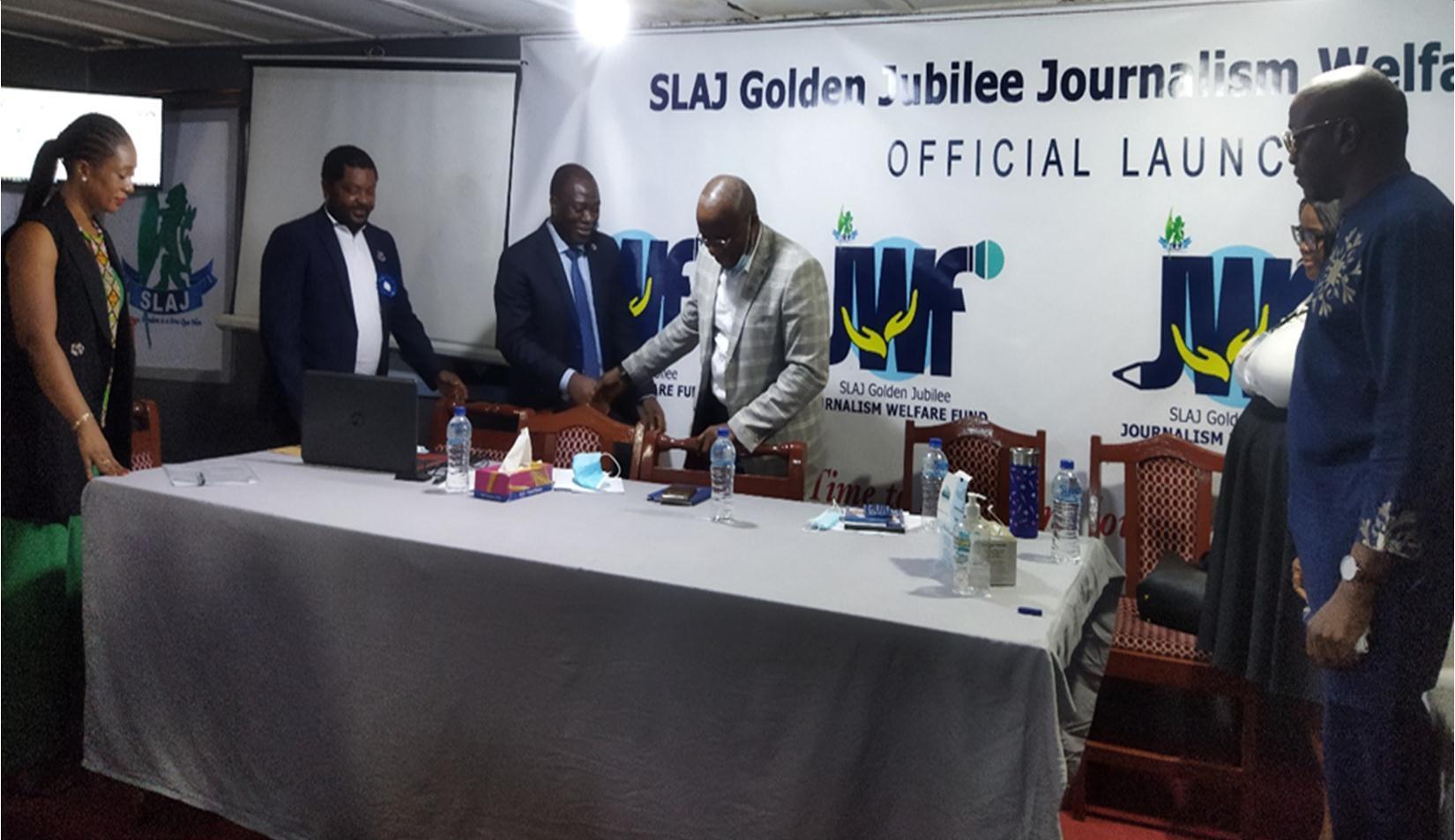By Ibrahim Joenal Sesay
FREETOWN, Feb. 25 (232news.com) – UN Resident Coordinator in Sierra Leone Dr. Babatunde Ahonsi, has emphasised that Sierra Leone fledgling democracy requires the process of democratic consolidation requires the active participation of citizens.
“It is the social and constitutional responsibility of the mass media to keep citizens engaged in governance processes by informing, educating, and mobilizing them around national aspirations, as well as holding government and other key state and non-state actors accountable to the people. Accordingly, the media must routinely help set the stage for public discussion and be a watchdog of the actions of government, other key institutions, and powerful interests.”
Dr. Babatunde Ahonsi made this remarks while serving as a Keynote speaker and official launch the Journalism Welfare Fund at SLAJ Hall, SLAJ Headquarters, Freetown on the 14 February 2022.
“In words of Tom Stopppard, a Czech-born British playwright and screenwriter, “…if your aim is to change the world, journalism is a more immediate short-term weapon.” Stoppard, who worked as a journalist in Bristol may have made this assertion decades ago. However, his words still ring true in a country like Sierra Leone, where the UN system continues to work with the Government, development partners and the citizens, including SLAJ and the media, to ensure that progress is made towards the achievement of the 2030 Agenda for Sustainable Development and that no one is left behind in that progress.”
He went on to applauded the efforts of SLAJ in developing a plan that has led to this day – the launching of the Journalism Welfare Fund to help address issues affecting the welfare of journalists, especially in emergencies or critical situations.
“It is worth noting here that journalism in Sierra Leone has not been spared the devastating impact of the ongoing COVID-19 pandemic as shown by data from a 2021 national survey on the pandemic’s impact on journalism in Sierra Leone.”
He added that for example, the survey indicated that COVID-19 affected the mental wellbeing of a majority of journalists – 76.4 percent reported an increased sense of vulnerability, 67.6 percent reported increased anxiety, and over 50 percent reported they experienced depression, and grief. Financially, 36.3 percent took a pay cut and 16.1 percent of journalists lost their jobs.
“These figures from the report are alarming and represent a call to action that all of us must play a critical role in ensuring the Good Health and Well Being of journalists and every human being. Mr President, I cannot agree more with SLAJ’s statement that, “a welfare support scheme is critical for journalism, which in turn is essential for our democracy and for a strong and vibrant society“.”
He said to perform this role freely and responsibly, however, the media sector has to have a high degree of editorial independence, financial viability, and supportive of plurality and diversity of voices. In particular, a minimum level of material and social protection must be enjoyed by media practitioners for independent and public interest journalism to thrive.
“It is well known that poorly paid and job-insecure journalists are highly vulnerable to being used as proxies for advancing narrow or vested interests that undermine the common good when persistently exposed to intimidation, bribery and control.”
He continues to say the last two points underpin the UN system’s continued engagement as a strategic partner of the media in Sierra Leone. Few years ago, UNDP and UNESCO supported a media strategy to map and address the capacity needs of the media sector and particularly professional media through a number of stakeholder workshops.
“But more needs to be done. The Sierra Leone media itself has the onus of opening the space and making it lucrative for private investment. Owners of media houses, almost entirely journalists themselves, should consider bringing onboard like-minded investors with business acumen to attract and retain a rich diversity of professionals in the sector. It is also perhaps now time for stakeholders in the media sector to seriously work to establish minimum Comprehensive Conditions of Service as well as institute customized insurance and pension packages for journalists if the media is to creditably play is expected role in democratic governance and sustainable development.”
He disclosed that moreover, a continued focus on data-driven, evidence-based reporting and investigative journalism could propel the industry into new heights.
“Professionalism is also crucial if we want to ensure that the media landscape is lucrative enough for us to address the welfare of journalists, especially during emergencies. The United Nations, on its part, will continue its engagement with the media to help address the several challenges that have been highlighted. We may not have all the answers, but we want to be partners in this drive to ensure that the media in Sierra Leone is fit-for-purpose as the fourth estate of the realm.”
As he officially launched the Journalism Welfare Fund, he called on all well-meaning Sierra Leoneans and friends of the media to support this great initiative.
Statements were made by, Dr. Ekundayo Gilpin Managing Director, Rokel Commercial Bank, Dr. Chindu Seedharan, Faculty of Media and Communication, Bournemouth University, Orange Head of Public Relation Annie Wonnie Karra and Mercury International Chief of Staff Dawi Cummings-John while Dr. Victor Massaquoi served as Chairperson.

